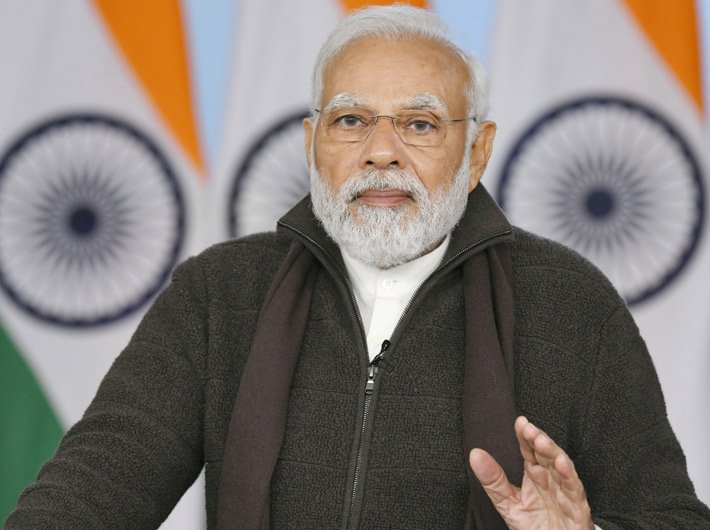PM addresses 1st Annual State Ministers’ Conference on Water, says Water Vision @ 2047 is an important dimension of the journey of Amrit Kaal
The first All India Annual State Ministers’ Conference on Water was inaugurated by prime minister Narendra Modi on Thursday. The theme of the conference is ‘Water Vision @ 2047’ and the objective of the forum is to bring together key policymakers for discussions on ways to harness water resources for sustainable development and human development.
Addressing the two-day gathering of the ministers of water resources from all states, being held in Bhopal, through video conferencing, the PM spoke of the unprecedented work done by India in areas of water security. He pointed out that in our constitutional system, the subject of water comes under the control of the states and it is the states' efforts for water conservation that will go a long way in achieving the collective goals of the country. “Water Vision @ 2047 is an important dimension of the journey of Amrit Kaal for the next 25 years,” he remarked.
Reiterating his vision of ‘whole of government’ and ‘whole of country’, Modi emphasised that all governments should work like a system wherein there should be constant interaction and dialogue between different ministries of state governments, such as the Ministry of Water, Ministry of Irrigation, Ministry of Agriculture, Ministry of Rural and Urban Development and disaster management. He further added that planning will get help if these departments have information and data related to each other.
Noting that success does not come from the efforts of the government alone, the PM drew attention to the role of public and social organisations and civil societies and asked for their maximum participation in the campaigns related to water conservation. He went on to explain that promoting public participation does not reduce the accountability of the government and it does not mean putting all the responsibility on the people. He further added that the biggest advantage of public participation is the awareness that is created among the public about the efforts being put into the campaign and the money being spent. “When the public is associated with a campaign, they also get to know the seriousness of the work. Due to this, a sense of ownership also comes in the public towards any scheme or campaign,” he added.
“When people joined the Swachh Bharat Abhiyan, a consciousness was awakened in the public as well.” Crediting the people of India for their efforts, he mentioned that the government took up many initiatives, be it collecting resources to remove filth, building various water treatment plants or constructing toilets, but the success of this campaign was ensured when the public decided that there should be no dirt at all. Modi emphasised the need to inculcate this idea of public participation towards water conservation and highlighted the impact that awareness can create.
The PM suggested, “We can organise ‘Water Awareness Festivals’ or an event related to water awareness can be added to the fairs held at the local level.” He stressed the need to make the younger generations aware of this subject through innovative ways from curriculum to activities in schools. The Prime Minister informed that the country is constructing 75 Amrit Sarovar in every district and 25,000 Amrit Sarovars have already been built. He underlined the need to connect technology, industry, and startups to identify problems and find solutions and mentioned technologies like geo-sensing and geo-mapping that can be of great help. He also stressed the need to come up with government policies and bureaucratic procedures to tackle water-related issues at the policy levels.
The PM noted the water requirements in both the industry and agriculture sectors and recommended that special campaigns be run to make them aware of water security. He gave examples of techniques like crop diversification and natural farming that create a positive effect on water conservation. He also highlighted the ‘Per Drop More Crop’ campaign that began under the Prime Minister Agricultural Irrigation Scheme and informed that more than 70 lakh hectares of land in the country have been brought under micro-irrigation so far. “Micro-irrigation should be promoted continuously by all the states”, he added. He also gave the example of the Atal Bhujal Sanrakshan Yojana where water-shed work is necessary on a large scale in all the districts for groundwater recharge and also stressed the need to pace up development works to revive the spring shed in hilly areas.
Throwing light on the need to increase the forest cover in the states for water conservation, the PM called for coordinated efforts by the ministries of environment and of water. He also called for attention to the conservation of all local sources of water and reiterated that gram panchayats should prepare an action plan for the next 5 years where a roadmap ranging from water supply to cleanliness and waste management should be considered. He also asked states to adopt ways where the water budget is prepared at the panchayat level based on how much water is required in which village and what work can be done for it.
Highlighting the success of the ‘Catch the Rain’ campaign, Modi reiterated that such campaigns should become an essential part of the State Government where they should be evaluated annually. “Instead of waiting for the rains, all the planning needs to be done before the rains,” he added.
